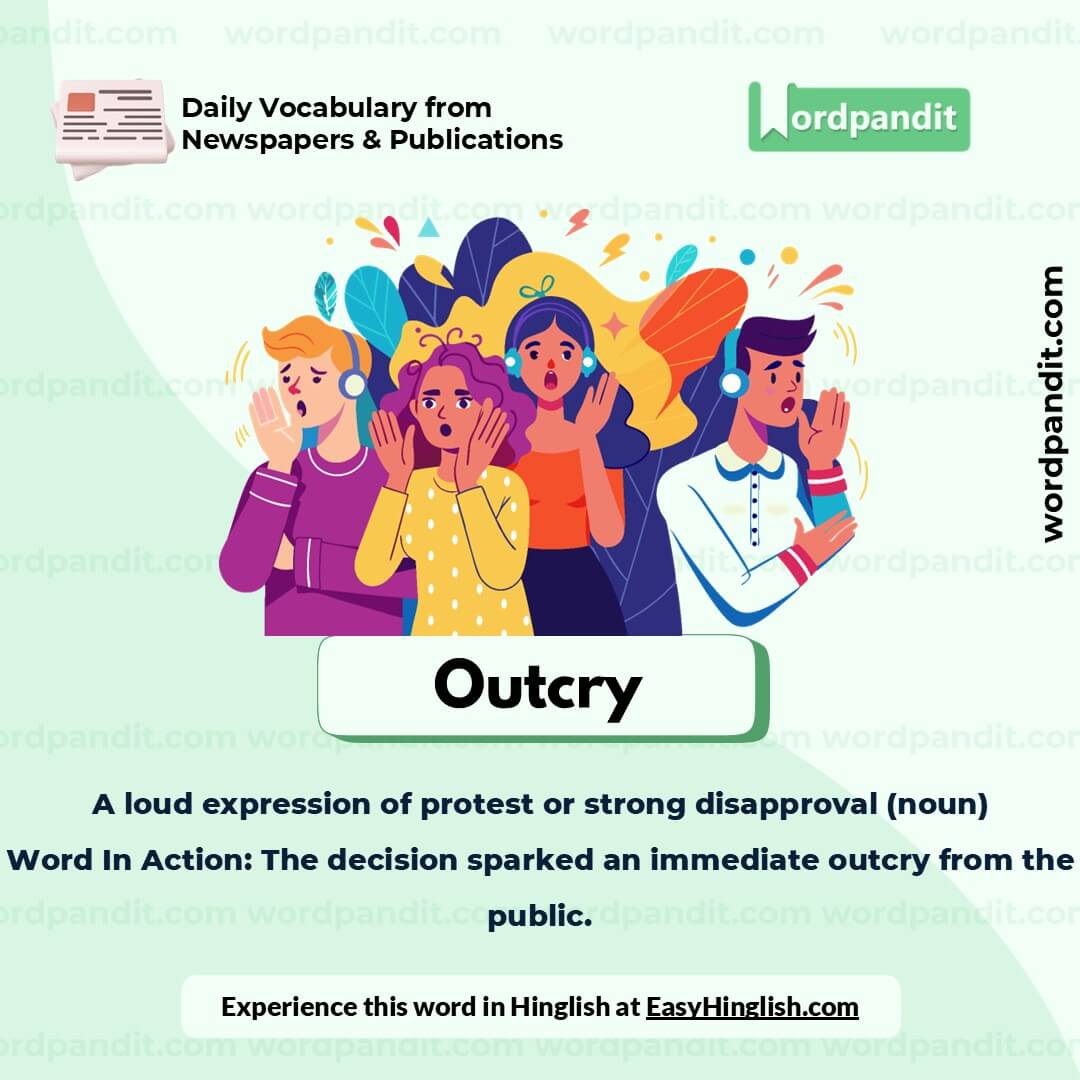Daily Vocabulary from Indian Newspapers and Publications
Welcome to Wordpandit’s Indian Vocabulary Hub
At Wordpandit, we understand the importance of staying rooted in the local context while expanding your language skills. This section focuses on enriching your vocabulary with words and phrases drawn from India’s leading newspapers and publications, ensuring you're learning vocabulary that is practical, relevant, and uniquely Indian.
Why Indian Sources Matter
We believe that the best way to master any language is by immersing yourself in local content. That’s why we carefully curate vocabulary from top Indian publications, including:
- The Hindu
- The Times of India
- The Economic Times
- Hindustan Times
- Live Mint
- The Indian Express
- And many others...
Stay Updated, Stay Relevant
With daily updates from Indian news sources, you’ll be consistently learning words that reflect the trends and shifts in Indian society and culture. Our focus is to provide vocabulary that enhances your understanding of the language in an Indian context.
How Wordpandit Supports Your Goals
Whether you’re preparing for exams, aiming to improve your professional communication, or simply want to stay connected with the latest Indian vocabulary, Wordpandit is here to guide you every step of the way.
Learn with a Practical Approach
Our interactive learning methodology includes real-world examples, engaging activities, and context-specific usage to ensure that every word becomes part of your active vocabulary.
Dive into Indian Vocabulary Today!
Why Choose Wordpandit?
Practical Learning: Focus on words you'll actually encounter in real-world reading, enhancing your comprehension and communication skills.
Diverse Content: From current affairs to scientific breakthroughs, our varied sources expose you to vocabulary across multiple domains.
Effortless Integration: Make Wordpandit a part of your daily routine. Just a few minutes each day can significantly boost your lexicon over time.
Your Path to Vocabulary Mastery
- Visit our Daily Vocabulary section regularly
- Explore new words and their usage in context
- Practice incorporating these words into your own writing and speech
- Track your progress as your vocabulary expands
Start Your Journey Today
Embark on your vocabulary enhancement journey with Wordpandit. By consistently engaging with our daily posts, you'll build a robust vocabulary that serves you well in academic, professional, and personal contexts.
Remember, a word a day keeps linguistic limitations at bay. Make Wordpandit your daily companion in the quest for vocabulary excellence!
WORD-1: Detractors
Context:
"Detractors counter that it is a disaster waiting to happen." - The Hindu
Explanatory Paragraph:
A detractor is someone who criticizes or speaks negatively about an idea, person, or project, often aiming to undermine it. In the sentence, detractors are those who foresee failure and warn others against potential risks.
Meaning: A person who disparages or criticizes someone or something (noun)
Pronunciation: dih-TRAK-ter
Difficulty Level: ⭐⭐⭐ (Intermediate)
Etymology: From Latin detractare meaning "to pull down, disparage"
Synonyms & Antonyms:
Synonyms: critic, opponent, fault-finder, naysayer
Antonyms: supporter, advocate, ally, proponent
Usage Examples:
- Despite having many detractors, the new policy was eventually successful.
- Her detractors claimed she lacked the experience to lead the project.
- The company's detractors spread rumors to discredit its success.
- Even with detractors doubting his ability, he proved them wrong with his achievements.
Cultural Reference:
"Keep away from those who try to belittle your ambitions. Small people always do that, but the really great make you feel that you, too, can become great." - Mark Twain
Think About It:
Why might detractors be essential in evaluating new ideas or projects, even if they seem negative?
Quick Activity:
Think of a famous figure or project that faced detractors initially but later proved successful. Write a short paragraph about how they overcame criticism.
Memory Tip:
Remember "detractors" by thinking of people who "detract" or take away from something by criticizing it.
Real-World Application:
The word "detractors" is frequently used in discussions about public figures, businesses, or new projects facing opposition, providing a way to discuss criticism and its impact.
WORD-2: Perpetual
Context:
"Placing Kerala under the perpetual threat of power shortages in the summer months." - The Hindu
Explanatory Paragraph:
The word "perpetual" describes something that continues without pause or end. Here, it emphasizes the constant, unending risk of power shortages that Kerala faces every summer, suggesting a persistent and potentially unavoidable issue.
Meaning: Never-ending or unchanging; occurring continually (adjective)
Pronunciation: per-PECH-oo-uhl
Difficulty Level: ⭐⭐⭐ (Intermediate)
Etymology: From Latin perpetuus meaning "continuous, unceasing"
Synonyms & Antonyms:
Synonyms: eternal, endless, ceaseless, unceasing, constant
Antonyms: temporary, intermittent, occasional, fleeting
Usage Examples:
- The mountain's peak was covered in perpetual snow, even in summer.
- She had a perpetual smile, always radiating warmth and kindness.
- Due to perpetual construction, the road remained closed for years.
- The city's residents faced a perpetual shortage of clean water during dry seasons.
Cultural Reference:
"The only thing that is perpetual is change." - Heraclitus, suggesting that everything is in constant motion or flux.
Think About It:
Can a perpetual state be positive, or does it always suggest a problem? What are examples of both?
Quick Activity:
Think of something in your life that feels "perpetual." Write a sentence describing why it feels endless or unchanging.
Memory Tip:
Think of "perpetual" as "permanent" to remember its meaning of continuous, never-ending presence.
Real-World Application:
In discussions about sustainability, "perpetual" is often used to describe ongoing issues, like pollution or resource shortages, that require continuous attention and solutions.
WORD-3: Outcry
Context:
"Public outcry regarding safety prompted the State governments of that time to let such proposals fade away." - The Hindu
Explanatory Paragraph:
The term "outcry" refers to a strong and often vocal reaction from the public, usually against something they find unacceptable or concerning. In the given sentence, public outcry over safety issues led the government to reconsider its plans due to widespread objection.
Meaning: A loud expression of protest or strong disapproval (noun)
Pronunciation: OUT-krai
Difficulty Level: ⭐⭐⭐ (Intermediate)
Etymology: Derived from Middle English outen meaning "to cry out" combined with cry, suggesting a loud call or shout.
Synonyms & Antonyms:
Synonyms: protest, uproar, objection, backlash, clamor
Antonyms: approval, acceptance, agreement, support
Usage Examples:
- There was a massive outcry over the proposed cuts to public services.
- The company faced public outcry after details of its environmental impact surfaced.
- The policy change led to an outcry among employees concerned about job security.
- An outcry from parents led to a revision of the school's safety policies.
Cultural Reference:
"The outcry of the people is the best way to show that the heart of the nation is alive." - Paraphrased from historical leaders emphasizing the power of collective voice in democracy.
Think About It:
Why do you think public outcry can be such a powerful tool for change? What are some examples where it has led to positive outcomes?
Quick Activity:
Think of a recent event where there was a significant public outcry. Describe what led to it and the outcome.
Memory Tip:
Remember "outcry" as "crying out loud" in protest, a memorable way to recall it signifies strong public opposition.
Real-World Application:
The term "outcry" is widely used in discussions about social justice, as public outcry often brings issues to light, pushing for governmental and organizational changes.
WORD-4: Spontaneity
Context:
"The element of spontaneity is unmissable." - The Hindu
Explanatory Paragraph:
"Spontaneity" refers to the quality of being impulsive or acting on the spur of the moment without pre-planning. In the sentence, spontaneity adds an unplanned and lively energy that stands out, suggesting a refreshing or genuine action.
Meaning: The quality of being spontaneous, acting or done without premeditation (noun)
Pronunciation: spon-TAY-nee-uh-tee
Difficulty Level: ⭐⭐⭐ (Intermediate)
Etymology: From Latin spontaneus meaning "of one's own accord, voluntary"
Synonyms & Antonyms:
Synonyms: impulsiveness, naturalness, instinctiveness, unplanned
Antonyms: premeditation, calculation, planning, rigidity
Usage Examples:
- Her spontaneity added a refreshing unpredictability to the trip.
- The actor's spontaneity on stage kept the audience engaged and entertained.
- Sometimes, the best memories come from moments of pure spontaneity.
- The spontaneity of the child's laughter lightened up the whole room.
Cultural Reference:
"In character, in manner, in style, in all things, the supreme excellence is simplicity." - Henry Wadsworth Longfellow, emphasizing the beauty of spontaneity and natural behavior.
Think About It:
How does spontaneity contribute to creativity? Are there moments where spontaneity can be more valuable than careful planning?
Quick Activity:
Think of a recent time when you acted spontaneously. Write a short description of what led to that moment and how it made you feel.
Memory Tip:
To remember "spontaneity," think of "spontaneous energy"—acting in the moment without planning.
Real-World Application:
Spontaneity is often encouraged in creative industries like art, writing, and acting, where it can lead to genuine and innovative expressions that structured planning might limit.
WORD-5: Lexicon
Context:
"The slogans... have practically become a part of the Bengali lexicon." - The Hindu
Explanatory Paragraph:
The word "lexicon" refers to the vocabulary or set of words and expressions used in a particular language, dialect, or by a specific group. In the context, it suggests that these slogans have become so widely known and used that they’re now a recognized part of the Bengali language.
Meaning: The vocabulary of a language, a person, or a branch of knowledge (noun)
Pronunciation: LEK-si-kon
Difficulty Level: ⭐⭐⭐ (Intermediate)
Etymology: From Greek lexikon meaning "wordbook" or "dictionary"
Synonyms & Antonyms:
Synonyms: vocabulary, wordbook, glossary, terminology
Antonyms: none (Note: Lexicon generally has no direct antonym as it’s a specific concept)
Usage Examples:
- The lexicon of modern technology is full of terms like "algorithm" and "blockchain."
- Slang words quickly enter the teenage lexicon, becoming popular among young people.
- Medical students must learn an entirely new lexicon to understand anatomy and physiology.
- These words are part of a unique lexicon used only in specific regional dialects.
Cultural Reference:
"Words are, in my not-so-humble opinion, our most inexhaustible source of magic." - J.K. Rowling, highlighting the power of language and its evolving lexicon.
Think About It:
How does a language’s lexicon reflect the culture and values of its speakers? Can you think of examples where certain words reveal unique cultural traits?
Quick Activity:
Choose a hobby or interest of yours and make a list of five words that are part of its unique lexicon. Explain what each word means.
Memory Tip:
Remember "lexicon" by linking it to "lexical" items—words! Think of it as a “wordbook” or vocabulary specific to a language or field.
Real-World Application:
"Lexicon" is often used in discussions about linguistics, language learning, or when describing specialized vocabulary in fields like law, medicine, or technology.















